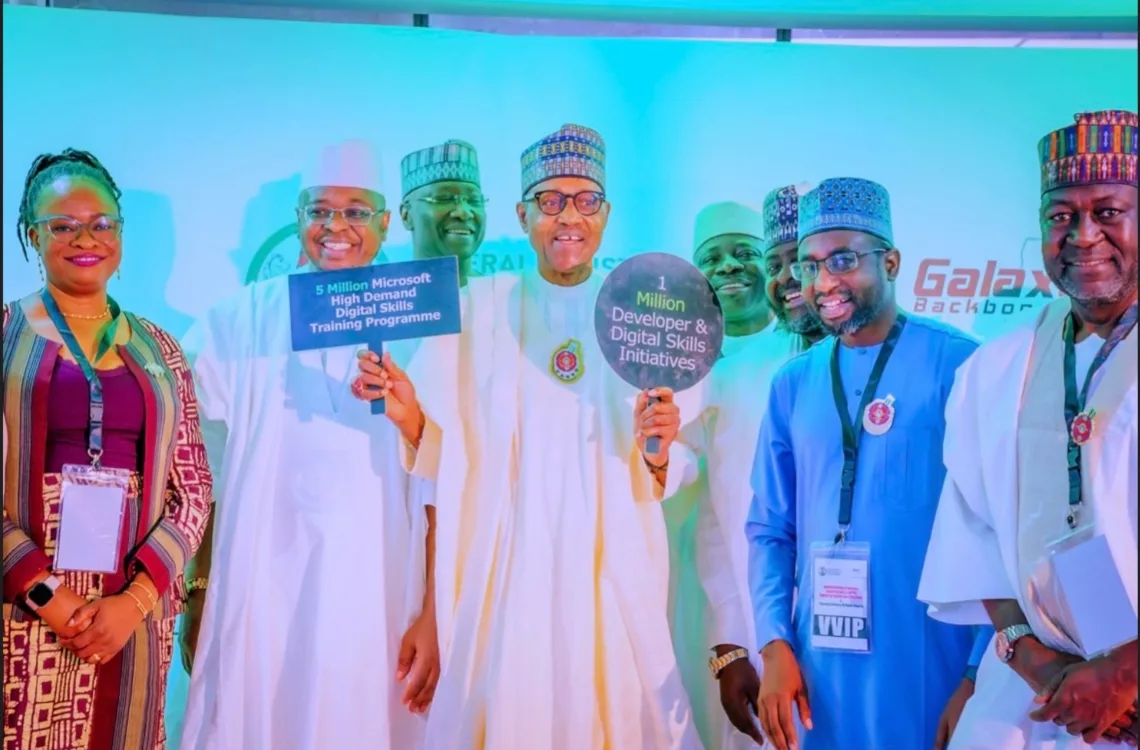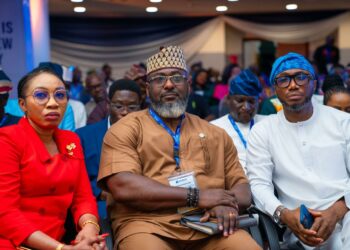The drive for economic diversification of the President Muhammadu Buhari-led federal government has been boosted by the milestone in the digital economy sector especially the Information and Communications Technology (ICT).
Following this development, President Muhammadu Buhari has lauded the effort of the federal government over the $547 million generated from the sale of the 3.5 GHz spectrum to MTN Nigeria and Mafab Communications for the provision of the 5G network in Nigeria, describing it as important revenue base for development.
The president made this known in his speech during the commissioning of the National Shared Services Centre (NSSC) in Abuja on Tuesday, adding that the whopping sum of money realised from the spectrum sale was an indication that the digital economy is driving growth, employment and wealth creation in the country.
The huge edifice being managed by the Galaxy Backbone Limited, is located within the Central Business District of the nation’s capital and it hosts a cybersecurity operations centre, network centre and call centre. It is a veritable platform for digital connectivity for Ministries, Departments and Agencies (MDAs) to interface with citizens.
The economic diversification agenda of the current administration has been boosted by the Information, ICT sector and improved the country’s GDP, which according to the National Bureau of Statistics (NBS) contributed an unprecedented 18.44 per cent to the GDP, in the Q2 of 2022 close to three times the 6.33 per cent contribution of the oil sector in the same quarter.
“As part of our efforts to expand our digital infrastructure, we increased our 4G base stations from 13,823 to 36,751 from August 2019 to date, and this has increased the percentage of 4G coverage across the country from 23 per cent to 77.52 per cent, also from August 2019 to date. We have also followed this up with the roll-out of 5G services.
“It is noteworthy that the digital economy sector has excelled in generating revenue for the government. In particular, at the Ministerial Retreat that I chaired from the 18th to 19th of October 2022, our independent analysts adjudged the digital economy sector to have generated 594 per cent of its revenue target from the 2019 baseline. This is very commendable.
“As part of these unprecedented achievements, the sector generated over $547 million dollars from the auctioning of the 5G spectrum alone,” Buhari said.
The president also said his administration has created the enabling environment “To ensure that the digital economy sector remains successful and in order to reduce the burden on citizens, I recently approved the suspension of the proposed excise duty in the telecoms sector, as any initiative that will lead to hardship for the citizens would not be pursued.”
He added that “Our administration’s commitment to promoting data promotion and privacy is receiving praise across the world, and we have increased our digital identity enrolments from 39 million in October 2020 to about 92 million today.
“The massive increase of about 63 million in about two years is a global success story and has led to several requests for partnership from countries within and outside Africa. I also approved the establishment of the Nigeria Data Protection Bureau on the 4th of February, 2022, to provide an institutional framework for data protection in Nigeria, in line with global best practices,” the president told the gathering of ICT experts and government officials.”
In his remarks, the minister of communications and digital economy Prof. Isah Ibrahim Pantami, commended the president for his support for the digital economy, with turnovers in broadband/Internet penetration, skills acquisition for global competitiveness and infrastructure development, like the fibre optic cable, which was about 15,000kms in 2015 and increased to more than 60,000kms.
Also, speaking the managing director of Galaxy Backbone, Prof Muhammed Bello Abubakar, said the need for digital inclusion prompted the agency to connect over 400 MDAs to the National Shared Services Centre.
Abubakar said further that the administration has made a significant milestone in the drive towards placing the country in the fast-changing world of the 4th Industrial Revolution.
“In today’s 4th Industrial Revolution World of rapid changes, driven by ubiquitous connectivity top the cyber world and advanced digital technologies such as Cloud Computing, Internet of Things (IoT), Artificial Intelligence Augmented Reality, Robotics etc, it is no accident also that most capitalised corporation from Apple, to Google, to Amazon to Microsoft etc, are the leading enablers of the World’s digital economy. Evidently, failure to embrace the new digital age will leave a nation stuck in the “sands of time.”
“It is in realisation of this fact that the federal government set up the Galaxy Backbone Limited in 2006 to drive digital inclusion in the public sector, underserved areas and other stakeholder’s communities – to complement the more significant progress in the ICT being recorded in the private sector economy.
“In keeping with its mandate the Galaxy has built a multi-platform ICT infrastructure connecting more than 400 Ministries, Departments and Agencies into a “one government” network platform known as 1-Gov.net and currently deploying terrestrial (Fibre) broadband connectivity to 30 states of the federation,” he said.
Galaxy Backbone has also made significant strides to inspire the confidence of its customers, including becoming the first public sector establishment to attain prestigious International Certifications that include the ISO 27001 in information Security Management; the ISO 20000 Certification in IT Services Management as well as the Payment Card Industry Data Security Standards(PCI-DSS).
With the enormous capacity for Data Hosting, Collocation and Cloud Computing which the edifice that was commissioned brings on board, Nigeria is certainly becoming well-placed to take its pride of place in the emerging digital world.





